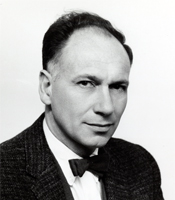Byron H. Waksman, M.D.

Brief Bio
Byron Halsted Waksman (1919–2012) was the fifty-fourth president of the American Association of Immunologists, serving from 1970 to 1971. An inspired teacher who championed the principles of openness and international cooperation in scientific research, Waksman studied multiple sclerosis and other inflammatory diseases as a faculty member at both Harvard and Yale Medical Schools before becoming an administrator and public spokesman for science.
The son of Selman A. Waksman, who was awarded the 1952 Nobel Prize in Physiology or Medicine, Byron followed in his father’s footsteps and pursued a career in science, receiving his M.D. from the University of Pennsylvania in 1943. Drafted into the U.S. Army after graduation, Waksman served overseas as part of the Allied occupation forces in France and Germany following the Second World War. Upon his return to the United States, he was a postdoctoral fellow at the Mayo Clinic (1946–1948) before studying under Michael Heidelberger (AAI ’35, president 1946–1947, 1948–1949) as a National Institutes of Health Fellow at the Columbia University College of Physicians and Surgeons (1948–1949). In 1949, Waksman received a joint appointment at Harvard Medical School and Massachusetts General Hospital as a research associate in neuropathology (1949–1952). Within three years, he was an associate bacteriologist at Massachusetts General Hospital (1952–1963) and an associate bacteriologist and immunologist at Harvard (1952–1957), where, in 1957, he joined the faculty as an assistant professor in the Department of Bacteriology and Immunology (1957–1963). Waksman left Harvard Medical School for the Yale School of Medicine in 1963. At Yale, he served as professor (1963–1974) and chair (1964–1970, 1972–1974) of the Department of Microbiology before becoming a professor in the Department of Pathology (1974–1979).
Waksman left academia in 1979 and accepted an administrative position as vice president for research programs and medicine at the National Multiple Sclerosis Society (1980–1989). Convinced that raising public awareness of science was key to securing the future of basic medical research, he founded and directed the Science Writing Program at the Marine Biological Laboratory at Woods Hole, Massachusetts (1990–1995), and the European Initiative for Communicators of Science program at the Max Planck Institute for Psychological Research near Munich (1992–1995). Further demonstrating his commitment to educating the next generation of scientists, Waksman taught middle school students at the Salk School of Science in New York during the late 1990s. In 2006, Waksman and his wife settled into a retirement community in Lexington, Massachusetts, where he spent his final years.
AAI Service History
Joined: 1950
President: 1970–1971
Vice President: 1969–1970
Councillor: 1965–1969
Secretary-Treasurer: 1961–1964
The Journal of Immunology
Associate Editor: 1960–1965
Editorial Board: 1966–1975
Committees
Advisory-Search Committee for Limitation of Abstracts: 1969–1970 (chair)
First International Congress of Immunology Committee: 1970–1971
First International Congress of Immunology Organizing Committee: 1971–1972
Program Committee: 1977–1980
Blue Ribbon Panel: 1978–1979 (chair)
Awards Committee: 1990–1993
Other Service
AAI Representative to FASEB Committee on Public Relations: 1955–1958
AAI Representative to FASEB Board: 1969–1970, 1971–1972
AAI Representative to FASEB Executive Committee: 1971–1972
AAI Representative to FASEB Subcommittee on Priorities and Planning: 1974–1975
President's Address
"
Immunology as a Basic and Applied Science," Delivered April 14, 1971
The Journal of Immunology 107, no. 3 (1971): 617–42.
Awards and Honors
- Fellow, American Academy of Arts and Sciences, 1979
- Charcot Award, Multiple Sclerosis International Federation, 1993
Institutional/Biographical Links